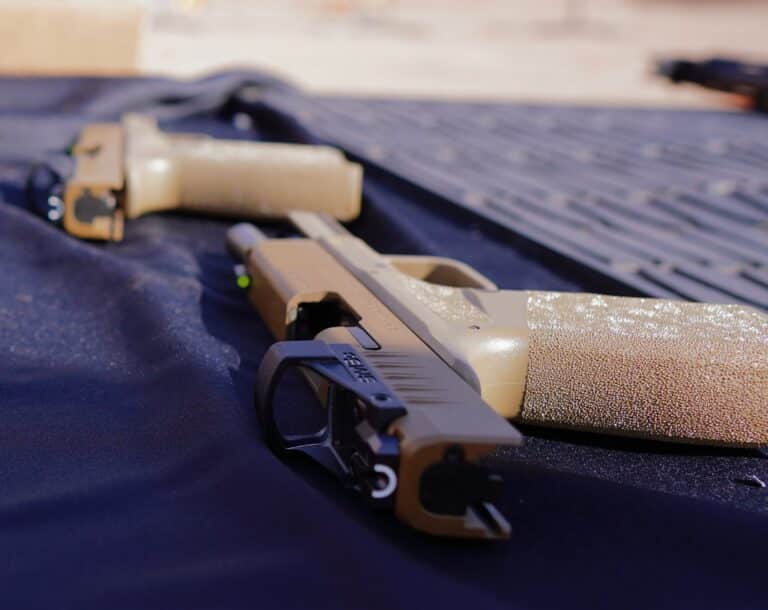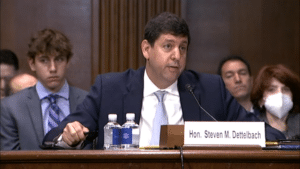Hunter Biden launched the opening salvo in a Second Amendment showdown with his father’s administration.
The younger Biden’s lawyers filed a motion in a Delaware federal court on Monday seeking to have his three-count felony firearms indictment for purchasing and possessing a revolver while an active drug user dismissed. The motion argues that each count should be tossed because they rely on criminal statutes that are “unconstitutional under the Second Amendment.”
“Not only does the unconstitutionality of Section 922(g)(3) render Mr. Biden’s alleged violation of that unconstitutional statute baseless, it compels the same conclusion as to the prosecution’s charges that Mr. Biden made a false statement in denying his status as a user of a controlled substance under 18 U.S.C. § 922(a)(6) and caused the seller (a holder of a federal firearms license) to maintain a record of this false answer in violation of 18 U.S.C. § 924(a)(1)(A),” the motion in US v. Biden reads.
The motion makes good on a threat first raised by Hunter Biden’s legal team at the onset of the Justice Department’s investigation. It pushes the president’s son back into the spotlight as perhaps the highest-profile Second Amendment plaintiff in the country, a position that stands in stark contrast to his father’s efforts to prioritize strict gun control and raise criminal penalties for illegal gun possession. It also places the younger Biden in an unusual alliance with some gun-rights advocates who have otherwise been critical of the Biden family due to the president’s stance on guns.
The Firearms Policy Coalition has even offered to assist the president’s son in overturning his gun charges.
“Our rights are more important than politics,” the group posted on X shortly after Hunter Biden’s lawyers filed their motion. “Our offer to assist in destroying this unconstitutional law still stands.”
Hunter Biden’s challenge to the federal statute comes as much of the jurisprudence around gun laws is being re-litigated, giving him a stronger case than he may have had in previous years. The Supreme Court set a new legal standard for reviewing Second Amendment cases in last year’s New York State Rifle and Pistol Association v. Bruen decision. That standard requires the government to demonstrate that a given gun restriction is supported by a longstanding tradition dating back to the Founding Era for it to be compatible with the Second Amendment.
The ruling has left federal judges divided over whether prohibitions related to drug use and gun ownership can pass muster. To date, more federal trial judges have upheld convictions related to the purchase and possession of firearms by drug users than have struck them down. However, the only federal appeals court to rule on the question since Bruen found that the federal gun ban for drug users was unconstitutional, at least as it applied to one particular marijuana user.
“In short, our history and tradition may support some limits on an intoxicated person’s right to carry a weapon, but it does not justify disarming a sober citizen based exclusively on his past drug usage,” Fifth Circuit Judge Jerry E. Smith, a Ronald Reagan appointee, wrote for a unanimous panel in US v. Daniels. “Nor do more generalized traditions of disarming dangerous persons support this restriction on nonviolent drug users.”
Hunter Biden’s lawyers argued in their brief that panel’s decision established the proper historical analysis for dismissing his charge for possessing a revolver as an active drug user.
“The Bruen framework is clear, and the historical record is immutable and the same before this Court as it was when the Fifth Circuit addressed it,” they wrote.
In turn, they argue that would make the other two charges related to lying on the background check form and causing the gun store to maintain false records invalid as well.
“Because persons protected by the Second Amendment can no longer be denied gun ownership due simply to past drug use—a practice inconsistent with this nation’s historical tradition on firearm regulation—any false statement by Mr. Biden concerning his status as having used a controlled substance no longer concerns’ any fact material to the lawfulness of the sale’ of a firearm,” their motion reads.
But not every federal court has agreed that Bruen dooms the federal ban. In August, District Judge C.J. Williams upheld an Iowa man’s conviction of possessing a gun while being a marijuana user. He ruled the prohibition is in line with Founding Era gun regulations.
“The Court finds that Section 922(g)(3) does not violate the Second Amendment on its face and therefore denies defendant’s motion to dismiss,” Judge Williams, a Donald Trump appointee, wrote last Monday in United States v. Grubb. “In arriving at this conclusion, the Court first finds that Section 922(g)(3) implicates conduct protected by the Second Amendment. Second, the Court concludes that Section 922(g)(3) is consistent with this Nation’s traditional regulation of possession of firearms by criminals.”
Judge Williams argued the ban targets dangerous people who lack self-control.
“[U]nder the more robust historic analysis demanded by Bruen, the Court is persuaded that Section 922(g)(3) withstands a constitutional attack,” he wrote. “Congress made it illegal for unlawful drug users to possess firearms for the common sense and obvious reason that someone using illegal drugs, in possession of a firearm, poses a real danger to the community.”
Hunter Biden’s legal fight stems from his October 2018 purchase of a Colt Cobra revolver. Though he only owned the gun for a few weeks—his then-girlfriend ultimately disposed of the weapon in a dumpster behind a Delaware grocery store—his 2021 memoir included an admission that he was using crack cocaine “every 15 minutes” during the period when he bought and owned the gun. Biden admitted in a hearing for a failed plea deal that the account of drug use he included in his book led prosecutors to ramp up scrutiny of his gun purchase.
Most of the recent federal rulings striking down the federal gun ban for drug users, including the Fifth Circuit’s Daniels decision, have done so with a limited application to particular marijuana users rather than those who use harder drugs like the president’s son. However, federal law doesn’t make a distinction in the type of illicit drugs involved in a gun possession crime. The Gun Control Act of 1968 makes it a federal felony to purchase or possess a firearm as “an unlawful user of a controlled substance.” It does not make a distinction between harder controlled substances and those like marijuana, which have increasingly been decriminalized at the state level in recent years.
Some federal judges who have upheld the drug prohibition, like Judge Williams, have argued against the approach of the Fifth Circuit to read marijuana out of the ban.
“This narrow reading and demand for near perfect analogues — despite acknowledging Bruen’s pronouncement analogues need not be perfect — is too severe and places too great an emphasis on the specific controlled substance Daniels used — marijuana — when Section 922(g)(3) regulates unlawful users and addicts of any controlled substance, not specific controlled substances,” he wrote.
Hunter Biden’s lawyers posed a similar argument against the court ruling on the federal gun ban for drug users based on specific substances. They said that making allowances for some drugs and not others would make the law too difficult to enforce and instead called for scrapping the ban altogether.
“The same problem would arise under Section 922(g)(3) if it were found unconstitutional in some instances but not others, with people having to wonder which controlled substances are covered, whether it matters when they were used last or how often, or if it matters whether drug use sedated them instead of making them violent,” they wrote.
Special Counsel David Weiss ultimately brought the felony firearms indictment against Hunter Biden this September as part of his broader investigation into the president’s son and alleged financial crimes. Hunter Biden faces a separate felony indictment for tax evasion.






